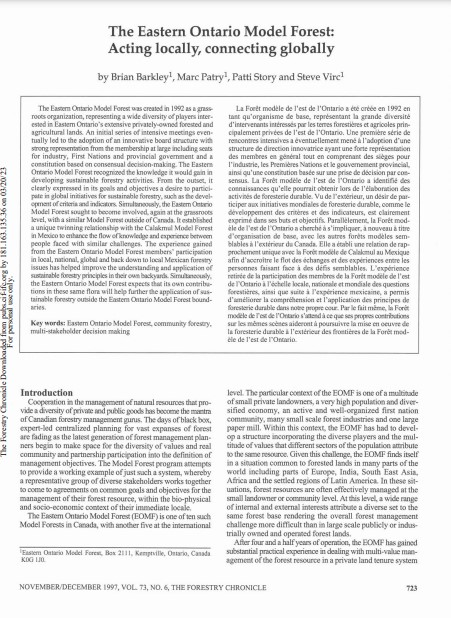The Eastern Ontario Model Forest: Acting locally, connecting globally
Bosque Modelo:
Eastern Ontario
Temática:
Gestión forestal
Tipo de documento:
Artículo científico
Resumen
The Eastern Ontario Model Forest was created in 1992 as a grassroots organization, representing a wide diversity of players interested in Eastern Ontario's extensive privately-owned forested and agricultural lands. An initial series of intensive meetings eventually led to the adoption of an innovative board structure with strong representation from the membership at large including seat for industry, First Nations and provincial government and a constitution based on consensual decision-making, The Eastern Ontario Model Forest recognized the knowledge it would gain in developing sustainable forestry activities. From the outset, it clearly expressed in its goals and objectives a desire to participate in global initiatives for sustainable forestry, such as the development of criteria and indicators. Simultaneously, the Eastern Ontario Model Forest sought to become involved, again at the grassroots level, with a similar Model Forest outside of Canada. It established a unique twinning relationship with the Calakmul Model Forest in Mexico to enhance the flow ofknowledge and experience between people faced with similar challenges. The experience gained from the Eastern Ontario Model Forest members' participation in local, national, global and back down to local Mexican forestry issues has helped improve the understanding and application of sustainable forestry principles in their own backyards. Simultaneously the Eastern Ontario Model Forest expects that its own contributions in these same flora will help further the application of sus tainable forestry outside the Eastern Ontario Model Forest boundaries
Información Bibliográfica
Autor:
Barkley, B, M Patry, P Story and S Virc.
Revista:
Forestry Chronicle
Año:
1997
N°:
4
País :
Canadá
Páginas:
723 - 726
Volumen:
73
Idioma:
Ingles
Palabras claves
Eastern Ontario Model Forest, community forestry, multi-stakeholder decision making





